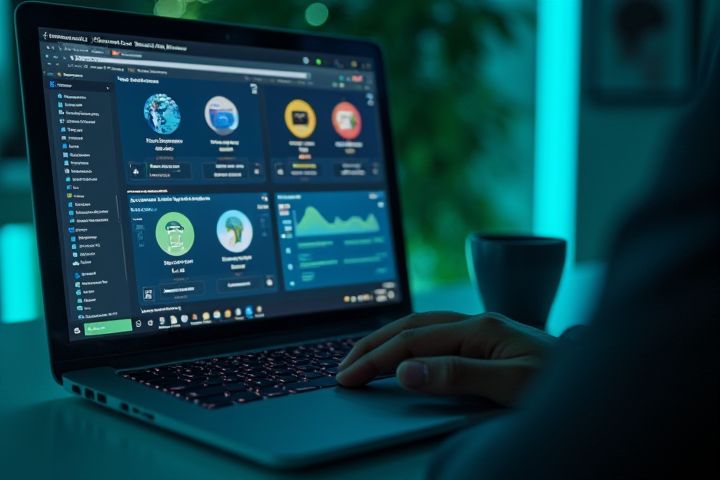
Nigeria has seen a significant increase in internet penetration, reaching over 100 million active users as of 2023, which corresponds to approximately 50% of the population. Mobile internet services dominate this landscape, primarily due to the widespread availability of affordable smartphones and 4G networks. The rise of social media platforms like Facebook, Twitter, and Instagram has transformed communication and business practices, fueling a vibrant digital economy. E-commerce is flourishing, with Nigerian startups leading innovations in online payments and logistics solutions to cater to the growing consumer base. As you navigate this dynamic digital ecosystem, you may encounter unique opportunities in areas such as tech entrepreneurship, online education, and remote work.
High mobile internet penetration
Nigeria boasts one of the highest mobile internet penetration rates in Africa, with over 90 million users accessing the web via smartphones and feature phones. This rapid adoption is fueled by the growth of affordable mobile data plans, as well as the expansion of 4G and 5G networks in urban centers. Social media platforms and messaging apps are particularly popular, driving significant engagement and digital communication among the population. As a result, your access to information and online services continues to broaden, reshaping the landscape of commerce, education, and social interaction in the country.
Dominance of social media platforms
In Nigeria, social media platforms have become the predominant channels for internet usage, with millions actively engaging daily on sites like Facebook, Twitter, and Instagram. These platforms facilitate communication, entertainment, and business opportunities, reflecting a vibrant digital culture among Nigerian youth. The rapid growth of mobile internet access contributes significantly to this dominance, allowing users to connect and share content easily. Understanding this trend is essential for businesses looking to tap into Nigeria's expanding digital market.
Popularity of online payment solutions
In Nigeria, the popularity of online payment solutions has surged, fueled by the rapid growth of e-commerce and mobile banking among the population. Major platforms such as Paystack and Flutterwave enable seamless financial transactions, empowering small businesses and enhancing consumer convenience. With an increasing smartphone penetration rate and significant internet access, the ease of making purchases online has led to a shift in consumer behavior towards digital payments. As a result, you can expect that the demand for innovative online payment options will continue to rise, shaping the future of commerce in Nigeria.
Growth in e-commerce sector
Nigeria's e-commerce sector is experiencing remarkable growth, driven by increasing internet penetration and smartphone accessibility. The country's population, which exceeds 200 million, presents a vast market for online shopping, supported by a rising middle class and changing consumer behaviors. Platforms like Jumia and Konga are at the forefront, offering varied products and services, from electronics to groceries, enhancing convenience for consumers. As digital payment solutions such as Flutterwave and Paystack gain traction, the e-commerce landscape in Nigeria continues to evolve, promising further expansion and opportunities for entrepreneurs and investors alike.
Challenges with internet connectivity
In Nigeria, internet connectivity remains plagued by numerous challenges, including infrastructural deficiencies and frequent power outages. The high cost of internet services often restricts access, particularly in rural areas where the necessary telecommunications infrastructure is lacking. Network congestion during peak hours diminishes user experience, contributing to slow download and upload speeds. To enhance your online experience, understanding these obstacles is crucial, as they significantly impact both personal and professional activities in the digital space.
Government regulations and policies
Government regulations and policies play a crucial role in shaping Internet use in Nigeria, aiming to promote digital inclusivity and cybersecurity. The Nigerian Communications Commission (NCC) oversees the telecommunications sector, ensuring compliance with regulations that foster competition and improve service delivery. Initiatives such as the National Digital Economy Policy and Strategy aim to enhance Internet infrastructure and accessibility across the country. Your understanding of these regulations can help navigate the complexities of online interactions and ensure a safer digital environment.
Digital literacy initiatives
Digital literacy initiatives in Nigeria have gained momentum, aiming to enhance internet use across various demographics. Programs targeting schools, communities, and small businesses emphasize essential skills such as online safety, digital marketing, and data management. Non-profit organizations and government agencies collaborate to provide workshops and resources, ensuring participants can navigate the digital landscape effectively. By fostering digital literacy, Nigeria is poised to improve economic opportunities and empower citizens, making technology an integral part of everyday life.
Emerging tech hubs and startups
Emerging tech hubs in Nigeria, such as Yaba in Lagos and Enugu's Startup Grind, are fostering innovation and entrepreneurship within the digital landscape. These dynamic environments support a multitude of startups focusing on sectors like fintech, e-commerce, and agritech, driving significant economic growth. As internet penetration continues to rise, your engagement with these tech ecosystems can enhance networking opportunities and access to resources. These hubs are not only attracting local talent but also securing international investment, positioning Nigeria as a key player in Africa's tech revolution.
Cybersecurity issues and awareness
In Nigeria, the rapid growth of internet usage has led to heightened cybersecurity concerns, as individuals and organizations face increasing threats from cybercriminals. Awareness initiatives are crucial, educating users on best practices for safeguarding personal information and preventing data breaches. Government agencies and private sectors are collaborating to implement robust cybersecurity frameworks and policies, promoting a safer online environment. By enhancing public knowledge and understanding of cybersecurity challenges, you can help create a more resilient digital landscape in Nigeria.
Expanding fiber-optic infrastructure
Expanding fiber-optic infrastructure in Nigeria is crucial for enhancing internet connectivity, resulting in faster and more reliable data transmission across urban and rural areas. This investment not only supports increased bandwidth but also promotes digital inclusion, ensuring that more citizens can access educational resources, e-commerce, and online services. Local governments and private sectors are collaborating to roll out extensive networks, aiming to bridge the digital divide that currently exists in many regions. As this development progresses, your ability to engage with global information will significantly improve, fostering economic growth and innovation within the country.
